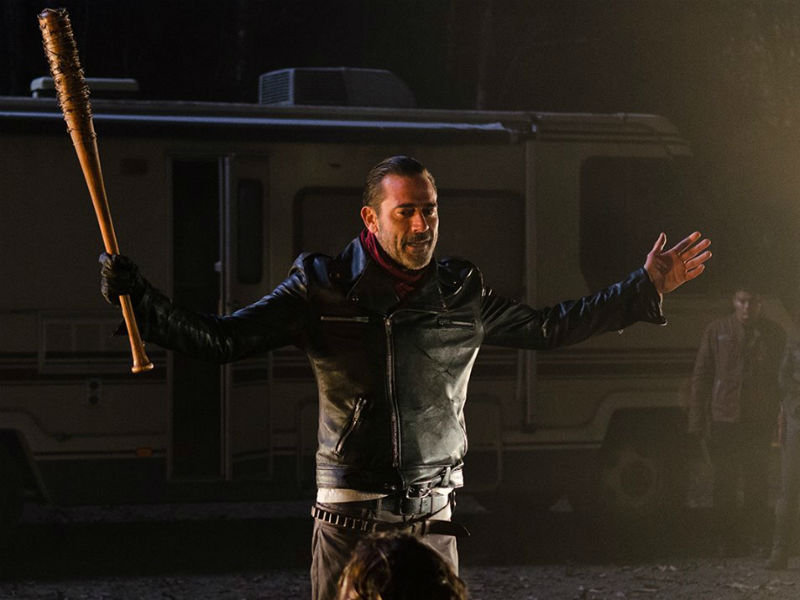Of all the doomed characters on last night's season premiere of "The Walking Dead," the one with truly the least hope of making it out unscathed was the AMC show itself.
Yes, that is a comical thing to say about what is still one of the most-watched television shows on air, but after last year's misguided cliffhanger finale – ending a season that already had one cheap and, at best, divisive cliffhanger moment and was building to a moment that wound up never happening – "The Walking Dead" had no chance last night. There was no way it was going to stick this landing; it was just a matter of how many bones it would break hitting the ground.
And the answer was most of them.
SPOILER ALERT TIME (though why are you reading this if you haven't watched the episode? Why are you even on the internet?)
So who got the axe – or the bat? Was it Glenn, as is in the comics? Was it Daryl, as many predicted considering Norman Reedus's rising star – and the impact of his death no matter the delay? Was it Michonne? Maggie? A side character that would mean nothing?
No, in the end, it was the only obvious choice for the show.
They killed two people – those two people being Abraham and Glenn.
Abraham was the loser of Negan's nursery rhyme selection, and when Daryl lashed out with a quickly put-down punch, Glenn then had to pay the price.
So why two? In the comics, Negan's arrival and brutal batting practice is one of its defining moments, a true moment of horror and shock – and a real challenge to replicate for the show based on it. Of course, "The Walking Dead" only made things more difficult for itself by delaying the results by half a year. Save for killing Rick, almost no character the show would choose as its victim could live up to the wait. So it did the only logical thing: It chose two victims (and if you think it's cold and cruel to think of characters' deaths like Justin Timberlake in "The Social Network" – "One brutal bat murder isn't cool. You know what's cool? TWO brutal bat murders." – yes, it is. More on that later).
There's just one problem: In the months between the finale and now, every possibility was floated – including killing two people. And the audience had time to process that – along with anything else that could've happened last night – and prepare to the point that last night really meant nothing. It's like going in to a movie knowing it has a massive twist at the end; you'll spend the whole movie trying to figure out the twist, only for the reveal to be one of the hundred of possibilities you figured it could be.
The only way for this moment to still work was for it to come in one piece, for all the horror to happen in one unstoppable moment. Then the horror of losing Abraham – not a truly MAJOR character, but one liked enough and big enough to make a ripple without actually causing waves – might have actually hit. And added by Glenn's surprise second death, a way to follow the comic story and try to maintain some its shock impact (though after the show's previous cliffhanger involving Glenn, it would still feel like a death already mourned). The show's last season had built to this moment.
But instead, "The Walking Dead" decided nah, throwing all that tension away, waiting six months and trying to start all over again next season. Rather than causing sadness, their deaths banged of predicted inevitability. Instead of "Oh my god," the response to the biggest moment in the show was, "Oh, well, of course," and maybe some recoil simply from the graphic, visceral ugliness of it all. But based on the true emotional impact of this supposedly monumental moment, Negan might as well have used a Nerf bat.
Speaking of bad storytelling: the entire rest of the episode, which was less season premiere than getting around to finally ending its finale. After teasing and stalling for six months (even longer if you call the last season one long tease and stall), "The Walking Dead" decided to resolve its cliffhanger ... with more stalling.
The premiere withheld the victims' identities for the entire first half of the episode, filling it instead with Negan delivering some playfully menacing speeches, taking Rick on an RV ride to a zombie horde, delivering more playfully menacing speeches, forcing him to get an axe and a few more playfully menacing speeches. Meanwhile, the episode kept taunting the viewer with dream images of all the cast members getting clubbed in the head, a cruel tease in the worst sense of both words (and talk about taking the impact away from a moment; just flash the same brutal act over and over again!).
Now, Jeffrey Dean Morgan is obviously having a blast playing Negan, and one could say that the journey back and forth was about breaking Rick in a way he'd never been before. But really, little comes of their journey that isn't accomplished by their return, when another cast member is put on the dramatic guillotine (Carl and his very lucky hand). Instead, it's just more wheel-spinning, putting a character in seeming danger for little real reason or motivation only to have Negan shoot some zombies away or change his mind, coming after months in self-imposed dramatic neutral, losing all built-up tension in the process.
So really, nothing new moved forward in the premiere; it existed solely to finally get around to murdering two of its characters. And when a show has you exclaiming "Finally!" about supposedly beloved characters getting bludgeoned into pulpy paste, something's gone dramatically wrong. A well-written show should not fill you with bloodlust to finally get around to murdering a protagonist – and it shouldn't treat its characters like Sid from "Toy Story," gleefully teasing them with their mangled fates (it doesn't help that "Westworld," airing the same night now, is a show delving into an audience's treatment and feelings towards fictional constructs).
I've lamented "Game of Thrones" for being cynical misery porn in the past, but compared to "The Walking Dead," it might as well be "The Big Bang Theory." It knows how to build true tension and how to make those moments mean something – even as a gut-punch. AMC's hit show, meanwhile, treats its characters as dramatic props, their gruesome and grisly deaths to be teased and teased and then teased a little more to the point of losing all effect. And, after this failed gambit, it seems it doesn't like its audience much more.
As much as it is a gigantic cliché to say that one has always had a passion for film, Matt Mueller has always had a passion for film. Whether it was bringing in the latest movie reviews for his first grade show-and-tell or writing film reviews for the St. Norbert College Times as a high school student, Matt is way too obsessed with movies for his own good.
When he's not writing about the latest blockbuster or talking much too glowingly about "Piranha 3D," Matt can probably be found watching literally any sport (minus cricket) or working at - get this - a local movie theater. Or watching a movie. Yeah, he's probably watching a movie.







